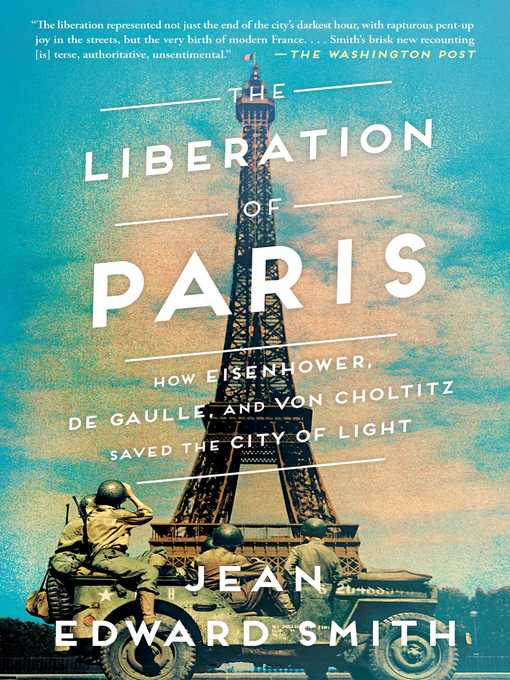
The Liberation of Paris
How Eisenhower, de Gaulle, and von Choltitz Saved the City of Light
فرمت کتاب
ebook
تاریخ انتشار
2019
نویسنده
Jean Edward Smithناشر
Simon & Schusterشابک
9781501164941
کتاب های مرتبط
- اطلاعات
- نقد و بررسی
- دیدگاه کاربران
نقد و بررسی

May 20, 2019
Historian and biographer Smith (Eisenhower in War and Peace) dishes up an outstanding concise history of one of the most dramatic moments of WWII: the liberation of the City of Light in August 1944. Drawing on extensive primary source research, Smith examines the liberation process and the events that led up to it through the eyes of the three leaders whose decisions minimized violence and destruction: the German general Dietrich von Choltitz, American general Dwight Eisenhower, and French general Charles De Gaulle. Smith recounts how von Choltitz turned from enthusiastically supporting Hitler to determined to disobey Hitler’s order to turn Paris into rubble, despite the threat to punish his wife and family. And he gives a fresh take on the relationship between Eisenhower and De Gaulle, attributing much of the liberation’s success to Eisenhower’s understanding of French language, culture, history, and domestic politics, which he acquired while serving on the Battle Monuments Commission in France in the 1920s. This, Smith maintains, enabled Eisenhower to work well with De Gaulle and understand the unique complexities of French domestic politics, which greatly influenced the way the liberation was conducted. Smith is an outstanding historian and tells a dramatic story well. This is a solid contribution to the history of WWII that both the general reader and the expert will find enjoyable and informative.

May 15, 2019
A tightly focused study of the political reasons that the Allies hesitated to liberate Paris when they could. Eminent historian Smith (Bush, 2016, etc.) has such a breadth of knowledge of this era in history that he is able to offer a distillation of swift-moving events surrounding the 1944 liberation of Paris in a marvelously readable fashion. Right from the beginning, the author smoothly sets the stage: While at first the occupation of Paris had seemed "a celebration of German victory" and a carnival for Germans on leave, as the military tide turned and brought food shortages and the Allied advance, the "collaborationists were beginning to look for cover." At the same time, the Communists and Resistance fighters in the city grew bolder. Charles de Gaulle, an unknown officer at the beginning of the war, self-exiled to London and spent years in the "wilderness" decrying Nazi occupation and bolstering French resistance only to be sidelined by President Franklin Roosevelt, who "believed the future of France lay with [Marshal] Pétain and Vichy." Smith underscores how Gen. Dwight Eisenhower, now supreme commander of Allied forces in Europe, acted as a masterful go-between for these two defiant forces. As the Allies advanced into France in June 1944, de Gaulle was anxious to be at the head of French forces entering Paris. He was perplexed that Eisenhower, who regarded the liberation of Paris as a distraction that would cause his troops to get bogged down in street-by-street fighting, had planned to bypass the city. Ultimately, de Gaulle convinced him that if liberation were delayed, the Communists would seize power in the vacuum. The author also insightfully explores the work of Gen. Dietrich von Choltitz, who was instructed by Hitler to reduce the city to ashes upon retreat yet craftily played both sides to save the day. A succinctly instructive historical narrative by a top-notch historian and author.
COPYRIGHT(2019) Kirkus Reviews, ALL RIGHTS RESERVED.

June 14, 2019
From June 1940 to August 1944, the capital of France was an occupied city. Although its surrender had been bloodless, it was unclear how the city would fare as World War II drew to a close. Many feared, with reason, that Adolf Hitler would order the destruction of Paris. According to historian Smith (Eisenhower in War and Peace), it was three military men on both sides of the conflict who were instrumental in ensuring that Paris survived liberation without catastrophic damage. As critical as Allied commander Dwight Eisenhower and French leader Charles de Gaulle were to the success of the operation, it may have been the courage of Dietrich von Choltitz, the German commander of Paris who played the largest role. Based on a close reading of memoirs by many of the key figures profiled, Smith dramatically presents a historical biography of a defining moment in time. VERDICT A fitting celebration and remembrance marking the 75th anniversary of the liberation of France and Paris. Recommended for readers of military history.--Linda Frederiksen, formerly with Washington State Univ. Lib., Vancouver
Copyright 2019 Library Journal, LLC Used with permission.

May 15, 2019
The seventy-fifth anniversary of D-Day has already prompted a spate of new books and will generate many more as June 6 approaches. Smith, a WWII expert, examines the fascinating circumstances surrounding the liberation of Paris, which took place with no destruction to the city. The conflict between political decision-making and military necessity made the question of invading Paris a tricky one, but, fortunately, as Smith shows, all the countries involved, including Germany, recognized the uniqueness and unrivaled beauty of the City of Light. Still, there were strong personalities and competing agendas involved in the negotiations?FDR, Churchill (in a minor role here), Eisenhower, de Gaulle, and, of course, Hitler. Eisenhower's decision to tilt toward de Gaulle's wishes, despite FDR's distrust of the man, forms the centerpiece of Smith's moving account, but the text makes clear in fascinating detail that the real hero of the story is German General Dietrich von Choltitz, whose realization of Hitler's growing instability led him to ignore or countermand the dictator's orders to destroy Paris, thus saving the great city. A fascinating chapter in the larger of story of the Allied victory in Europe.(Reprinted with permission of Booklist, copyright 2019, American Library Association.)

























دیدگاه کاربران